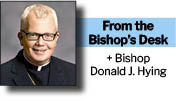
November is the traditional month we as Catholics ponder the Four Last Things: Death, Judgment, Heaven, and Hell.
As we celebrate All Saints’ Day on November 1 and pray for all the souls in Purgatory on November 2, God draws our hearts to ponder the brevity of this life, the urgency of conversion, the beauty of eternity with God, and the possibility of losing our salvation through habitual mortal sin without repentance.
In remembering and praying for the dead, we affirm our deep spiritual communion with all those who have gone before us and ask the Lord to pardon their sins and bring them home to the glory of Heaven where the saints will shine like the sun.
Clearing up misconceptions
Throughout my life as a priest, I have heard many misconceptions about the Four Last Things, which I would like to comment on here.
Many people today assume that all those who die automatically go to Heaven, that God in His goodness will forgive everyone of everything regardless of how they have lived or whether or not they have repented of their sins. This is not true.
When someone asked the Lord if they are few in number who will be saved, Jesus answered, “Strive to enter through the narrow gate, for many, I tell you, will attempt to enter but will not be strong enough.” (Luke 13: 24)
God takes seriously what we do in this life, whether we strive to know, love, and serve God or not; whether we repent of our sins or not; whether we are serious about holiness or not.
The Lord’s overwhelming desire is that every person He created comes to salvation, but He does not force us against our will to accept His grace. It is possible for us to lose eternal life, but only God can judge that. Only He knows what is in our minds and hearts. Only He can measure the depth of our love.
A corollary to the “everybody immediately goes to Heaven” thinking is a disbelief in Purgatory.
I think that most people will eventually go to Heaven, (we, of course, want everyone to be with God) but no one is completely worthy of entering the Heavenly wedding feast.
Even if we die in a state of sacramental grace, human weakness still clings to us.
Purgatory is a merciful process God offers to us, whereby He cleanses our sins and failings, helped by the prayer of the Church on Earth until we are completely purified and ready to enter into the awesome presence of God.
Without such preparation, we would not be able to bear the glory and holiness of the Lord. This truth is why we pray for the dead.
Another falsity many people succumb to is the conviction that Hell does not exist, or that if it does, no one is there.
While we can never pronounce judgment on whether any particular person is in Hell or not, the Church has always held out the possibility that we can freely lose our eternal salvation.
While we should not live ruled by fear, this truth should convict us of the urgency to practice our faith well and to allow the Lord to root serious sin out of our lives.
In reading the Scriptures, we can clearly see that Satan and his minions are a malevolent spiritual force, seeking to pull us away from Christ and His saving mercy. The battle between Christ and the devil occurs in every soul, and thus we need the sacramental power of the Church to gain the victory.
A popular notion of Heaven is that we become angels, floating around on clouds or that Heaven is simply an amplification of the things we enjoyed here on Earth.
We do not become angels in Heaven. As pure souls, liberated from the power of sin and death by the Lord in His purging fire, we will enjoy perfect happiness in the beatific vision.
We will know the glory and light of the risen Christ forever, in communion with the Most Holy Trinity and all of the saints!
This perpetual bliss beyond our imagining is infinitely more exciting and fulfilling than floating around on a cloud or enjoying a perpetual (take your pick . . . ) football game, pizza, walk in the woods, or any other Earthly thing we draw pleasure from.
Believing in the resurrection
We Catholics believe in the resurrection of the body.
At the end of time, we know not how, God will resurrect, glorify, and reconstitute our bodies.
This belief flows from the fact that death is not natural to our original nature as God intended, but rather the fruit of sin.
We are incarnate spirits; therefore, our bodies will also find a place in the resurrection of the just.
For this reason, the Church in her funeral rituals prefers that we bury the body of our deceased loved ones, as a sign of that belief and a respect for the body as a temple of the Holy Spirit.
I understand that Catholics who cremate the mortal remains of their loved ones are not doing so to deny the resurrection of the body, but ideally, the body should be present, at least for the funeral.
All of these Catholic teachings point to the glorious truth that the Lord has prepared a place for us in the Kingdom of Heaven and that we are here on Earth to make our pilgrim way to the Father’s house and to bring as many people as we can with us.
In this upcoming month of November, as we celebrate the saints and pray for the dead, may our longing for our Heavenly homeland and our love for the Lord only increase, even as the light and the warmth of the sun decrease.
The Four Last Things point us to our glorious destiny. May meditating on them fill us with love, thanksgiving, and zeal for the things of God!

